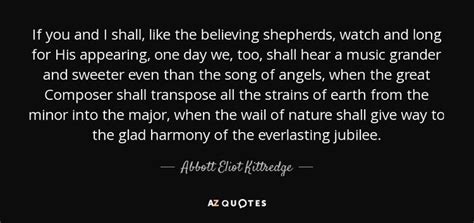A Quote by C. S. Lewis
Is it easy to love God' asks an old author. 'It is easy,' he replies, 'to those who do it.' I have included two Graces under the word Charity. But God can give a third. He can awake in man, towards Himself, a supernatural Appreciative love. This is of all gifts the most to be desired. Here, not in our natural loves, nor even in ethics, lies the true centre of all human and angelic life. With this all things are possible.
Related Quotes
Man depends on God for all things: God depends on man for one. Without man's love God does not exist as God, only as creator, and love is the one thing no one, not even God himself, can command. It is a free gift or it is nothing. And it is most itself, most free, when it is offered in spite of suffering, of injustice, and of death . . . The justification of the injustice of the universe is not our blind acceptance of God's inexplicable will, nor our trust in God's love, his dark and incomprehensible love, for us, but our human love, notwithstanding anything, for him.
The problem of reconciling human suffering with the existence of a God who loves, is only insoluble so long as we attach a trivial meaning to the word "love", and look on things as if man were the centre of them. Man is not the centre. God does not exist for the sake of man. Man does not exist for his own sake. "Thou hast created all things, and for thy pleasure they are and were created." We were made not primarily that we may love God (though we were made for that too) but that God may love us, that we may become objects in which the divine love may rest "well pleased".
When we look at the cross we see the justice, love, wisdom and power of God. It is not easy to decide which is the most luminously revealed, whether the justice of God in judging sin, or the love of God in bearing the judgment in our place, or the wisdom of God in perfectly combining the two, or the power of God in saving those who believe. For the cross is equally an act, and therefore a demonstration, of God’s justice, love, wisdom and power. The cross assures us that this God is the reality within, behind and beyond the universe.
Feuerbach ... recognizes ... "even love, in itself the truest, most inward sentiment, becomes an obscure, illusory one through religiousness, since religious love loves man only for God's sake, therefore loves man only apparently, but in truth God only." Is this different with moral love? Does it love the man, this man for this man's sake, or for morality's sake, for Man's sake, and so-for homo homini Deus-for God's sake?
We are not to make the Torah into God Himself, nor the Bible into a "paper pope." The Bible is only the result of the Word of God. We can experience the return of the Word of God in the here and now, the perpetual return of the actual, living, indisputable Word of God that makes possible the act of witnessing, but we should never think of the Bible as any sort of talisman or oracle constantly at our disposal that we need only open and read to be in relation to the Word of God and God Himself.
We come before God to pray for the missing and the dead, and for those who loved them... Our purpose as a nation is firm, yet our wounds as a people are recent and unhealed and lead us to pray... This world he created is of moral design. Grief and tragedy and hatred are only for a time. Goodness, remembrance, and love have no end, and the Lord of life holds all who die and all who mourn... Neither death nor life nor angels nor principalities, nor powers nor things present nor things to come nor height nor depth can separate us from God's love.
The person who loves God cannot help loving every man as himself, even though he is grieved by the passions of those who are not yet purified. But when they amend their lives, his delight is indescribable and knows no bounds. A soul filled with thoughts of sensual desire and hatred is unpurified. If we detect any trace of hatred in our hearts against any man whatsoever for committing any fault, we are utterly estranged from love for God, since love for God absolutely precludes us from hating any man.
Our Lord’s making of a disciple is supernatural. He does not build on any natural capacity of ours at all. God does not ask us to do the things that are naturally easy for us- He only asks us to do the things that we are perfectly fit to do through His grace, and that is where the cross we must bear will always come.



































